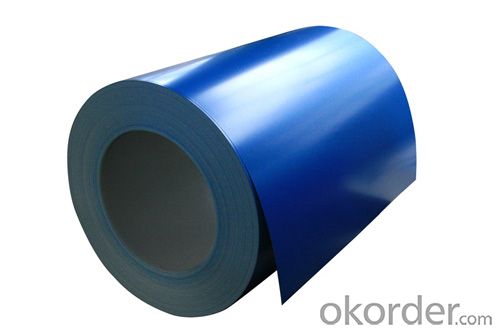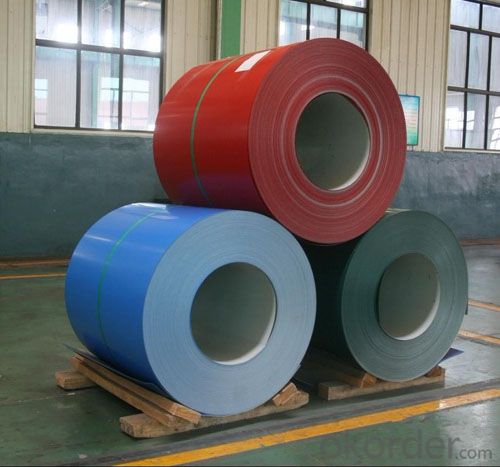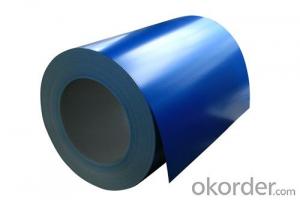PE/PVDF Painted Aluminum Coil for Construction
- Loading Port:
- China main port
- Payment Terms:
- TT OR LC
- Min Order Qty:
- 5 m.t.
- Supply Capability:
- 5000 m.t./month
OKorder Service Pledge
OKorder Financial Service
You Might Also Like
Item specifice
1. Description of PE/PVDF Painted Aluminum Coil for Construction
| Alloy No. | Thickness (mm) | Width (mm) | Temper | |
| A1050,A1060, A1070,A1100,A1235,A1245 | 0.2-3.0 | 20-2200 | O,H12,H22,H14,H24,H16,H26,H18 | |
| 4.0-12.0 | 1000-2200 | H111,H112 | ||
| A3003,A3004,A3105 | 0.2-4.0 | 20-2200 | O,H12,H22,H14,H24,H16,H26,H18 | |
| 4.0-12.0 | 1000-2200 | H111,H112 | ||
| A5052,A5083,A5754,A5005 | 0.2-4.0 | 20-2200 | O,H12,H22,H14,H24,H16,H26,H18 | |
| 4.0-12.0 | 1000-2200 | H111,H112 | ||
| A6061,A6082,A6063 | 0.8-3.0 | 20-2200 | O | |
| A8011,A1145,A1235 | 0.005-0.2 | 20-2200 | O,,H18,H24 | |
| ID | 76mm,152mm,200mm,300mm,505mm | |||
| Packing : Export wooden pallets, wooden case | ||||
| Standards:ASTM-B209. EN573-1, GB/T3880.1-2006 | ||||
| Quality of material: totally free from defects like white rust, oil patches, roll marks, edge damage, camber, dents, holes, break lines, scratches and free from coil set | ||||
2. Application of PE/PVDF Painted Aluminum Coil for Construction
Mainly used insigns, billboards, building exterior decoration, bus body, high-rise buildings and factories wall decoration, kitchen sink, lamp, fan leaves, with pieces of electronic, chemical equipment, sheet metal processing parts, deep drawing or spinning hollowware, welding parts, heat exchangers, bell surface and disk, plate, kitchenware, decorations, reflective devices, ect
3. Feature of PE/PVDF Painted Aluminum Coil for Construction
1.High temperature resistant
2.Weathering resistant
3.Scrubbing resistant
4.Sound insulation
5.Acid or alkali proof
6. Fireproof
7.Light weight material is easy to construct and install
4. Certificate:
SGS and ROHS(if client request, paid by client), MTC(plant provided), Certificate of Origin(FORM A, FORM E, CO), Bureau Veritas and SGS (if client request, paid by client), CIQS certificate
5. Image of PE/PVDF Painted Aluminum Coil for Construction


5. FAQ
1) What is the delivery time?
Dpends on actual order, around 20 days
2) What is the QC system:
We have QC staff of 20 persons and advanced equipment, each production is with MTC traced from Aluminum ingot lot.
3) What market do you mainly sell to?
Australia, America, Asia, Middle East, Western Europe, Africa etc
- Q:I need help with 3 main ideas for a aluminum and copper chloride lab. I need evidence for these 3 ideas that what happened was a chemical reaction.
- Change in mass, change in color, change in temp, change in ...
- Q:Can aluminum coils be used in extreme temperature conditions?
- Yes, aluminum coils can be used in extreme temperature conditions. Aluminum has a high melting point of 660.32°C (1220.58°F) and can withstand extreme heat without deforming or melting. Additionally, aluminum has excellent thermal conductivity, allowing it to quickly transfer heat away from the coil. This makes it suitable for various applications, including air conditioning, refrigeration, and heating systems that may encounter extreme temperature conditions. Moreover, aluminum coils are lightweight and corrosion-resistant, making them a preferred choice in many industries.
- Q:What are the different coil uncoiling options for aluminum coils?
- Aluminum coils have a range of coil uncoiling options available to them, catering to specific needs and requirements. One method commonly employed is manual uncoiling, where the coil is carefully unwound by hand. This approach is typically used for smaller coils or situations that demand precision and control. Manual uncoiling enables the delicate handling of the aluminum coil and is frequently favored in smaller scale operations. Another alternative is mechanical uncoiling, which employs machinery or equipment to unwind the coil. Mechanical uncoiling is suitable for larger coils or high-volume production. It facilitates faster and more efficient uncoiling, reducing the labor involved in the process. Moreover, specialized uncoiling machines exist to accommodate specific requirements. For instance, certain machines are designed to handle delicate or sensitive materials and offer features such as adjustable tension control to prevent any damage to the aluminum coil during uncoiling. Additionally, there are custom uncoiling solutions that can be tailored to meet specific needs. These solutions may employ different mechanisms or techniques to ensure the safe and efficient uncoiling of aluminum coils. Ultimately, the choice of coil uncoiling option depends on factors such as coil size, production volume, required precision, and any specific needs or constraints of the application.
- Q:Can aluminum coils be used in the manufacturing of aircraft parts?
- Yes, aluminum coils can be used in the manufacturing of aircraft parts. Aluminum is a lightweight and durable material that is widely used in the aerospace industry due to its high strength-to-weight ratio and corrosion resistance. The coils can be formed and machined into various components such as fuselage skins, wings, and structural frames, making them an ideal choice for aircraft manufacturing.
- Q:Can aluminum coils be used in the production of architectural façades?
- Aluminum coils are indeed suitable for the production of architectural façades. Façades made of aluminum are highly favored due to their durability, lightweight characteristics, and aesthetic attractiveness. By incorporating aluminum coils into façade manufacturing, customization becomes effortless, as they can be readily molded and fashioned into different designs and profiles. Moreover, aluminum exhibits resistance against corrosion, rendering it suitable for outdoor use. Furthermore, it possesses exceptional thermal and acoustic insulation properties, thereby enhancing energy efficiency and soundproofing. In conclusion, aluminum coils offer a versatile and efficient choice for the creation of architectural façades.
- Q:Can aluminum coils be used in high-altitude environments?
- Indeed, the utilization of aluminum coils is feasible in high-altitude settings. Thanks to its lightweight and resistance to corrosion, aluminum is a fitting material for various purposes, including in high-altitude scenarios. Aluminum coils are often employed in air conditioning systems, heat exchangers, and refrigeration units, all of which can operate efficiently at high altitudes. The high strength-to-weight ratio of aluminum enables it to endure the harsh conditions encountered at high altitudes, encompassing low temperatures, strong winds, and low atmospheric pressure. Moreover, aluminum is non-magnetic, providing an advantage in specific high-altitude applications like aerospace and satellite technologies. Additionally, aluminum exhibits exceptional thermal conductivity, facilitating efficient heat transfer and rendering it perfect for deployment in cooling systems functioning in high-altitude environments. Its resistance to corrosion also ensures durability and the ability to withstand the impact of moisture, which can be prevalent in such settings. All in all, owing to their lightweight nature, resistance to corrosion, thermal conductivity, and strength, aluminum coils serve as a dependable and appropriate choice for utilization in high-altitude environments.
- Q:Will aluminum foil go off in a metal detector
- Aluminum was a METAL last I checked.
- Q:Can aluminum coils be used in marine environments?
- Yes, aluminum coils can be used in marine environments. Aluminum is widely used in marine applications due to its excellent corrosion resistance properties. It forms a protective oxide layer that prevents further oxidation and corrosion, making it suitable for various marine equipment and structures.
- Q:What are the typical thickness tolerances for aluminum coils?
- The specific manufacturing standards and industry requirements play a role in determining the typical thickness tolerances of aluminum coils. Generally, the range of thickness tolerances for aluminum coils is between +/- 0.001 and 0.005 inches. These tolerances are crucial in maintaining the thickness of the aluminum coils within acceptable limits, ensuring they meet the desired specifications and applications. It should be emphasized that the intended use of the aluminum coils, whether for architectural, automotive, or aerospace purposes, may influence the specific tolerances.
- Q:What are the weight considerations when using aluminum coils?
- When using aluminum coils, there are several weight considerations to take into account. Firstly, aluminum coils are generally lighter in weight compared to other metals, such as steel. This makes them a popular choice in industries where weight reduction is a priority, such as automotive manufacturing or aerospace applications. The lightweight nature of aluminum coils allows for improved fuel efficiency in vehicles and increased payload capacity in airplanes. Secondly, the weight of the aluminum coil itself is important to consider. Depending on the specific application, the weight of the coil may need to be within certain limits to ensure proper functioning and structural integrity. For example, in HVAC systems, the weight of the aluminum coil needs to be suitable for the unit to be mounted securely and able to withstand vibrations or pressure changes. Additionally, the weight of the aluminum coil can impact transportation and installation. Lighter coils are easier to handle, transport, and install, reducing the time and effort required for these processes. This can be particularly advantageous in construction projects where large quantities of aluminum coils are used. It is also crucial to consider the weight-bearing capacity of the structures or equipment that will be supporting or utilizing the aluminum coils. The weight of the coils, combined with any additional components or materials, should not exceed the load capacity of the system to avoid structural failure or safety hazards. Lastly, the weight of aluminum coils can affect cost considerations. Since aluminum is typically priced based on weight, lighter coils may be more cost-effective compared to heavier alternatives. However, it is important to strike a balance between weight reduction and meeting the required performance and strength specifications. In conclusion, weight considerations when using aluminum coils encompass factors such as the overall weight reduction benefits, the weight of the coil itself, transportation and installation ease, load-bearing capacity, and cost implications. Taking these considerations into account ensures the successful and efficient utilization of aluminum coils in various industries and applications.
1. Manufacturer Overview |
|
|---|---|
| Location | |
| Year Established | |
| Annual Output Value | |
| Main Markets | |
| Company Certifications | |
2. Manufacturer Certificates |
|
|---|---|
| a) Certification Name | |
| Range | |
| Reference | |
| Validity Period | |
3. Manufacturer Capability |
|
|---|---|
| a)Trade Capacity | |
| Nearest Port | |
| Export Percentage | |
| No.of Employees in Trade Department | |
| Language Spoken: | |
| b)Factory Information | |
| Factory Size: | |
| No. of Production Lines | |
| Contract Manufacturing | |
| Product Price Range | |
Send your message to us
PE/PVDF Painted Aluminum Coil for Construction
- Loading Port:
- China main port
- Payment Terms:
- TT OR LC
- Min Order Qty:
- 5 m.t.
- Supply Capability:
- 5000 m.t./month
OKorder Service Pledge
OKorder Financial Service
Similar products
New products
Hot products
Hot Searches
Related keywords




























